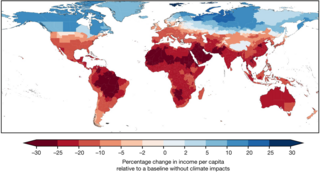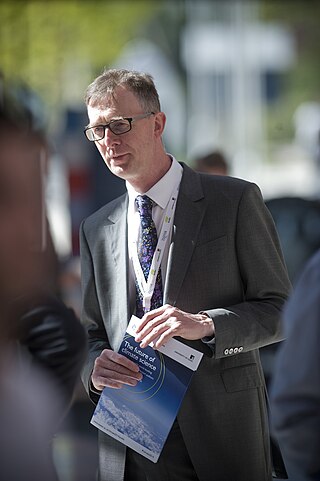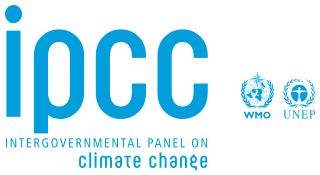
Effects of climate change are well documented and growing for Earth's natural environment and human societies. Changes to the climate system include an overall warming trend, changes to precipitation patterns, and more extreme weather. As the climate changes it impacts the natural environment with effects such as more intense forest fires, thawing permafrost, and desertification. These changes impact ecosystems and societies, and can become irreversible once tipping points are crossed.

Climate change mitigation (or decarbonisation) is action to limit the greenhouse gases in the atmosphere that cause climate change. Greenhouse gas emissions are primarily caused by people burning fossil fuels such as coal, oil, and natural gas. Phasing out fossil fuel use can happen by conserving energy and replacing fossil fuels with clean energy sources such as wind, hydro, solar, and nuclear power. Secondary mitigation strategies include changes to land use and removing carbon dioxide (CO2) from the atmosphere. Governments have pledged to reduce greenhouse gas emissions, but actions to date are insufficient to avoid dangerous levels of climate change.

Economic analysis of climate change is about using economic tools and models to calculate the magnitude and distribution of damages caused by climate change. It can also give guidance for the best policies for mitigation and adaptation to climate change from an economic perspective. There are many economic models and frameworks. For example, in a cost–benefit analysis, the trade offs between climate change impacts, adaptation, and mitigation are made explicit. For this kind of analysis, integrated assessment models (IAMs) are useful. Those models link main features of society and economy with the biosphere and atmosphere into one modelling framework. The total economic impacts from climate change are difficult to estimate. In general, they increase the more the global surface temperature increases.

Land use, land-use change, and forestry (LULUCF), also referred to as Forestry and other land use (FOLU) or Agriculture, Forestry and Other Land Use (AFOLU), is defined as a "greenhouse gas inventory sector that covers emissions and removals of greenhouse gases resulting from direct human-induced land use such as settlements and commercial uses, land-use change, and forestry activities."

Climate change adaptation is the process of adjusting to the effects of climate change. These can be both current or expected impacts. Adaptation aims to moderate or avoid harm for people, and is usually done alongside climate change mitigation. It also aims to exploit opportunities. Humans may also intervene to help adjustment for natural systems. There are many adaptation strategies or options. They can help manage impacts and risks to people and nature. The four types of adaptation actions are infrastructural, institutional, behavioural and nature-based options.
Adaptive capacity relates to the capacity of systems, institutions, humans and other organisms to adjust to potential damage, to take advantage of opportunities, or to respond to consequences. In the context of ecosystems, adaptive capacity is determined by genetic diversity of species, biodiversity of particular ecosystems in specific landscapes or biome regions. In the context of coupled socio-ecological social systems, adaptive capacity is commonly associated with the following characteristics: Firstly, the ability of institutions and networks to learn, and store knowledge and experience. Secondly, the creative flexibility in decision making, transitioning and problem solving. And thirdly, the existence of power structures that are responsive and consider the needs of all stakeholders.
Climate risk is the potential for problems for societies or ecosystems from the impacts of climate change. The assessment of climate risk is based on formal analysis of the consequences, likelihoods and responses to these impacts. Societal constraints can also shape adaptation options. There are different values and preferences around risk, resulting in differences of risk perception.

The economics of climate change mitigation is a contentious part of climate change mitigation – action aimed to limit the dangerous socio-economic and environmental consequences of climate change.
A climate change scenario is a hypothetical future based on a "set of key driving forces". Scenarios explore the long-term effectiveness of mitigation and adaptation. Scenarios help to understand what the future may hold. They can show which decisions will have the most meaningful effects on mitigation and adaptation.

Climate change and poverty are deeply intertwined because climate change disproportionally affects poor people in low-income communities and developing countries around the world. The impoverished have a higher chance of experiencing the ill-effects of climate change due to the increased exposure and vulnerability. Vulnerability represents the degree to which a system is susceptible to, or unable to cope with, adverse effects of climate change including climate variability and extremes.
Climate resilience is a concept to describe how well people or ecosystems are prepared to bounce back from certain climate hazard events. The formal definition of the term is the "capacity of social, economic and ecosystems to cope with a hazardous event or trend or disturbance". For example, climate resilience can be the ability to recover from climate-related shocks such as floods and droughts. Methods of coping include suitable responses to maintain relevant functions of societies and ecosystems. To increase climate resilience means one has to reduce the climate vulnerability of people and countries. Efforts to increase climate resilience include a range of social, economic, technological, and political strategies. They have to be implemented at all scales of society, from local community action all the way to global treaties.

The contributions of women in climate change have received increasing attention in the early 21st century. Feedback from women and the issues faced by women have been described as "imperative" by the United Nations and "critical" by the Population Reference Bureau. A report by the World Health Organization concluded that incorporating gender-based analysis would "provide more effective climate change mitigation and adaptation."

The effects of climate change on small island countries are affecting people in coastal areas through sea level rise, increasing heavy rain events, tropical cyclones and storm surges. These effects of climate change threaten the existence of many island countries, their peoples and cultures. They also alter ecosystems and natural environments in those countries. Small island developing states (SIDS) are a heterogenous group of countries but many of them are particularly at risk to climate change. Those countries have been quite vocal in calling attention to the challenges they face from climate change. For example, the Maldives and nations of the Caribbean and Pacific Islands are already experiencing considerable impacts of climate change. It is critical for them to implement climate change adaptation measures fast.

William Neil Adger is Professor of Human Geography at the University of Exeter.

Fatima Denton is a British-Gambian climatologist. She is the director at the Ghanaian branch of the United Nations University, at the UNU Institute for Natural Resources in Africa (UNU-INRA) in Accra. She focuses on innovation, science, technology and natural resource management. She partners with countries such as Benin and Liberia to develop and implement country needs assessment missions.

The Sixth Assessment Report (AR6) of the United Nations (UN) Intergovernmental Panel on Climate Change (IPCC) is the sixth in a series of reports which assess the available scientific information on climate change. Three Working Groups covered the following topics: The Physical Science Basis (WGI); Impacts, Adaptation and Vulnerability (WGII); Mitigation of Climate Change (WGIII). Of these, the first study was published in 2021, the second report February 2022, and the third in April 2022. The final synthesis report was finished in March 2023.

Climate change vulnerability is a concept that describes how strongly people or ecosystems are likely to be affected by climate change. Its formal definition is the "propensity or predisposition to be adversely affected" by climate change. It can apply to humans and also to natural systems. Issues around the capacity to cope and adapt are also part of this concept. Vulnerability is a component of climate risk. Vulnerability differs within communities and also across societies, regions, and countries. It can increase or decrease over time.

Caroline Mary Saunders is a New Zealand academic, and as of 2020 is a Distinguished Professor at Lincoln University, specialising in environmental economics. She is a Fellow of the Royal Society Te Apārangi.
Daniela N. Schmidt is a German earth scientist and professor at the University of Bristol. Her research investigates the impact of climate change on marine ecosystems. She is the lead author for the Intergovernmental Panel on Climate Change (IPCC) report on Impacts, Adaptation and Vulnerability for Europe.

Robert Nicholls is currently the Director of the Tyndall Centre for Climate Change Research and a professor of climate adaptation at the University of East Anglia in Norwich, United Kingdom.















